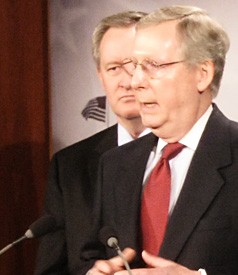
– GOP says ‘tough shite’ … about 20 percent [in real terms] of Americans out of work as GOP blocks jobless benefits –
By: David Lightman | McClatchy Newspapers
Washington – Republicans almost unanimously oppose spending $33.9 billion for extended unemployment benefits for some 2.5 million people who’ve lost them, because they say it would increase federal budget deficits.
At the same time, they’re pushing a permanent extension of Bush administration tax cuts, especially for the wealthy, which could increase federal budget deficits by trillions of dollars over the next 10 years.
How do they justify this?
“Tax policy is dynamic. If you have the right kind of tax reform, it helps generate a more dynamic economy,” said Sen. Mike Crapo, R-Idaho, a member of the Senate Finance Committee, which writes tax law. While that may be true, even the Bush Treasury Department concluded that its tax cuts increase budget deficits.
Besides, wouldn’t providing $33.9 billion to extend unemployment benefits to 2.5 million people help the economy?
“There’s a distinction between taxes and spending,” Crapo said. “We have a huge problem with a lack of spending restraint.”
In addition, noted Iowa Sen. Charles Grassley, the committee’s top Republican, “This is a tax increase if you don’t extend, and it’s not a tax cut if you do.”
Democrats howl at what they see as hypocrisy.
The GOP argument, said Sen. Tom Harkin, D-Iowa, is “that we should cut off some of the most desperate people in our economy, take away their last meager lifeline, because we’re concerned about the deficit.
“Yet those very same senators are demanding that we extend hundreds of billions of dollars in tax breaks for the wealthiest Americans in our society.”
The money for jobless benefits is expected to win approval early next week after weeks of Republican-led extended debate.
The next big economic-policy fight in Congress will involve the tax cuts, the 2001 and 2003 cornerstones of former President George W. Bush’s economic program. Most are set to expire Dec. 31, meaning that taxes on income, capital gains, dividends and estates would go up next year and the child care credit would be cut in half, to $500 per child.
President Barack Obama would reinstate the top two pre-Bush marginal income tax rates of 36 and 39.6 percent, starting with adjusted gross incomes of more than $250,000 for joint filers and $200,000 for individuals. The current top rates are 33 and 35 percent.
Obama would retain the Bush-era rates ranging from 10 to 28 percent for those who earn less.
Congressional Democrats are weighing whether acting on taxes before the November elections would give them a political boost or instead give constituents troubled by record federal deficits more cause for concern.
“We haven’t determined the timetable” for considering tax cuts, said House Majority Leader Steny Hoyer, D-Md.
Asked whether it could be done in a post-election lame-duck session, he said: “The goal was to get it done before they expire.”
Conservatives contend that tax policy should be considered differently from spending. Taxes spur the economy, their thinking goes, because the more consumers spend and invest, the more businesses will hire and the more the economy will grow. Reducing tax revenue, they claim, will force spending restraint on Congress.
On the other hand, they say that extending unemployment benefits without offsetting revenue doesn’t appreciably boost the economy and could weaken jobless workers’ incentive to seek new employment.
Liberals, boosted by a report earlier this year from the nonpartisan Congressional Budget Office, maintain that the jobless benefits go to those who need them most and are likely to spend them quickly, and that multiplies their economic effect.
The CBO and Congress’ Joint Committee on Taxation said earlier this year that extending the original Bush-era tax cuts would increase budget deficits by $2.56 trillion during this decade. Deficits under Obama’s budget plan are expected to total about $9.75 trillion over the next 10 years.
Other tax experts say the government should tax the wealthy at higher rates so that some wealth can be redistributed to those who may need aid, the traditional progressive taxation principle that guides U.S. tax law.
“I believe it would be a serious mistake to make any of the tax cuts permanent now,” said Leonard Burman, a professor of public affairs at Syracuse University’s Maxwell School. However, he said, not all of the tax cuts should expire, since “low- and middle-income households are facing serious cash-flow constraints.”
Douglas Holtz-Eakin, the chief economist for Bush’s Council of Economic Advisers from 2001 to 2002, warned against letting any tax rates rise, saying “the prospect of a large tax increase would force households to undertake even more balance sheet repair.”
ATTENTION READERS
We See The World From All Sides and Want YOU To Be Fully InformedIn fact, intentional disinformation is a disgraceful scourge in media today. So to assuage any possible errant incorrect information posted herein, we strongly encourage you to seek corroboration from other non-VT sources before forming an educated opinion.
About VT - Policies & Disclosures - Comment Policy



